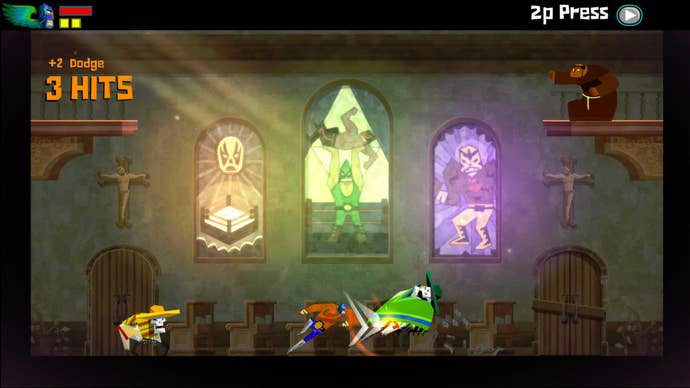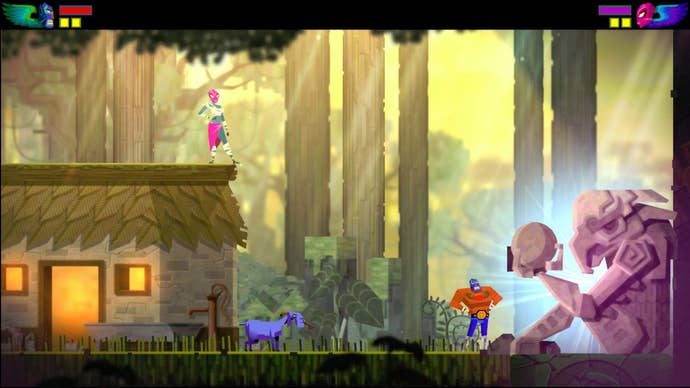Guacamelee Super Turbo Champion Edition PS4 Review: Metroid con Puñetazos
This slightly tweaked version of last year's slick metroidvania brawler remains a good, albeit frequently challenging, time.
This article first appeared on USgamer, a partner publication of VG247. Some content, such as this article, has been migrated to VG247 for posterity after USgamer's closure - but it has not been edited or further vetted by the VG247 team.
"It's like Super Metroid, except...." Congratulations! You've just described a massive swath of the indie game market.
Not that I'm complaining, since I absolutely love that style of game. And it's not like Nintendo has done much of anything with Metroid lately. But not all Metroid-alikes are made equal, and some play better than others.
Drinkbox Studio's Guacamelee, reissued afresh for the current generation of consoles this week as "Guacamelee Super Turbo Champion Edition," falls neatly into the "better" camp. It isn't even subtle about its creators' affection for Metroid, or about about wearing its influence on its sleeves; you acquire new powers by destroying the same Chozo statues that hold Samus Aran's upgrades aloft, for crying out loud. But like the best metroidvania games, Guacamelee doesn't settle for slavish imitation.
Drinkbox definitely gets the nuts-and-bolts design mechanics that make Metroid work. Guacamelee makes great use of all the fundamental hooks that make exploratory platformers so addictive; the game world is expansive and interconnected, with obvious points in each early area that demand revisiting once you've gained new skills that allow for more extensive exploration. And, as in Metroid, accessing deeper portions of the game doesn't revolve around finding widgets or key cards; there are no inventory items to juggle outside of a handful of sidequest-specific pickups. Instead, you gain entry to the game's later areas (and to secrets hidden within those early sections) by powering up your character. Each core ability protagonists Juan and Tostada gain allows them to break through different barriers or simply grants them the agility necessary to alight on out-of-reach areas.

Yet while it builds on Super Metroid's foundation all the way to the color-coding of different access points, Guacamelee doesn't rest on its predecessor's laurels. It adds its own distinctive ideas to the mix. The Mexican theme running throughout the game isn't just there to offer an excuse for Drinkbox to serve up eye-pleasing Mesoamerican visuals (though certainly it does that in spades); it also informs the game's mechanics. The protagonists dress and behave as luchadores, brawling their way through enemy hordes with punches, kicks, and above all else, grapples.
As such, the vast majority of power-ups you acquire enhance your fisticuff capabilities... and since those skills in turn affect your ability to explore throughout the environment, Guacamelee requires an element of dexterity uncommon to the genre. By the end of the game, you'll be performing incredibly intricate combinations of maneuvers — for example, shifting to dodge barriers as you perform a double-jump followed by a rapid aerial dash and mid-air uppercut combo, with a transition between realities to finish, all within the space of about three seconds. The challenge of games like Metroid normally comes in simply breaking down the world and figuring out where to go. Guacamelee, on the other hand, gives you an extensive game map with backtracking points clearly marked. The test here comes not in sorting out where you need to go but rather in actually proving you have the finger skills to get there.
This intricacy can work against the game at times; because the controller uses so many different styles of input and often demands a combination of techniques in rapid succession, the timing required for executing these commands can be awfully fussy when you could most use a bit of grace. Some of the particularly demanding sequences will have you pulling out your hair, and can definitely bring your progress skidding to a halt; the infamous battle with Javier Jaguar remains a doozy in this edition, but so too will you find some of the later platforming sequences equally bedeviling.

That's no bad thing, though. Guacamelee draws as much inspiration from frenetic fighting games as it does from more leisurely exploratory 2D action games, and it combines the feel of one with the structure of the other to overwhelming successful effect. However, like a fighting game, it does demand a certain level of commitment on the player's part. The combat sequences in particular won't let your reflexes coast along on casual mode; enemies appear in huge numbers with powerful attacks, and while you can power through them at times with combo skills or hulking out into berserker mode, those abilities come with innate limitations. Core skills and brisk evasion are just as essential to survival as button-mashing. The biggest shortcoming in combat comes from how easily you can lose track of your characters in a dense fracas — I took more than a few cheap shots just because I couldn't see where my poor hero ended up.
The other element Guacamelee's Mexican setting brings to the table takes the form of its overarching Dia Del Muerto theme. This proves to be more than a stylistic gimmick, though; yes, you're fighting skeletons and other undead, but the Dead World itself plays an instrumental role in the action. Protagonist Juan dies against the main antagonist right at the start of the game and is sent back into the world of the living in short order to put right Carlos Calaca's misdeeds. Being technically deceased, though, Juan can shift between the worlds of the living and the dead — a bit like Raziel in Soul Reaver. (Or you can insert another obligatory Dark Souls reference here, if you prefer.)
Phasing between realities plays a key role in both combat and exploration; many platforms or objects exist in one world but not the other. Likewise, certain enemies appear as invincible shadows in one reality and only become vulnerable as normal in the other. Once you gain the ability to jump between realms at will, it becomes a key element of your skill set in every area of the game.
There's a lot to keep track of in Guacamelee; it's very much an expert-mode take on the metroidvania style. While not as deliberately murderous as something like VVVVVV or 1001 Spikes, it raises the bar for difficult with its intricacy. And, perhaps more impressively, it manages to pose a challenge both as a brawler and as a puzzle platformer. That's a rare combination, and even rarer to see done right. While Guacamelee may sound like a dozen other small studio productions from the past few years at the high-level description, in practice it stands as something unique — and, more to the point, quite masterfully done.
VisualsColorful, detailed, and gorgeously animated, Guacamelee remains one of the best-looking 2D games ever created.
SoundLargely dodging the obvious cliché to go with mariachi or polka music, Guacamelee's soundtrack offers excellent mood and ambience, punctuated by grunts of luchador exertion.
InterfaceDense. Intricate. You'll use every button on the controller. But you'd better hope your timing is perfect.
Lasting AppealWith optional cooperative action and quite a few secrets, Guacamelee offers a good value for the money.
ConclusionAs fun in this beefed-up incarnation as in its original release, Guacamelee Super Turbo Champion Edition offers one of the best-designed and most original takes on the well-worn metroidvania phenomenon you'll ever find. The new material may not quite bring enough to the table to warrant a second purchase, and the game doesn't exactly push PS4 or Xbox One to the ragged edge of their capabilities, but once again excellent game design has less to do with technical specs and more to do with creativity and thoughtfulness: Features Guacamelee possesses in spades.
